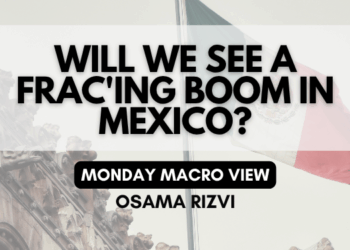If you turn on your TV and look at the news the headlines would indicate such a fast paced change of events that one’s head would start spinning. Oil is rising on a certain day because of supply concerns and other geopolitical considerations but the very next day we read that prices have fallen $5 in a few minutes (this happened after Biden announced release of SPR, which by the way only account for a few days of global consumption). It feels as if the “concerns” on the day before were either unwarranted, overblown or unsubstantiated. I say that because clearly there is no way that problems of this nature and magnitude can be resolved in a matter of weeks or months let alone a single day. Therefore, from the past few months, I have continued to maintain that the fluctuations in prices in the equity and commodity markets is mainly due to sentiments rather than fundamentals.
There is too much noise and too little signals. As such, I thought to start the month with a bigger picture article setting the tone for the next few weeks. First let’s look at the list of events, that I believe can provide some context in the confusion we all are encountering lately.
(a) Geopolitical confrontation: Russia-Ukraine
(b) Wild swings in oil markets: Oil lost $5 in minutes today!
(c) Building panic in the financial world: Rising interest rates, falling equity indexes
(d) Rampant inflation: With no signs of taming
(e) Soaring food prices: Exacerbated by climate events and point (a)
(f) Energy crisis: Europe + rising coal prices affecting EMDEs
(g) Political instability: African, Asian countries facing protests and unrests due to above reasons.
(h) Rising COVID cases!
Now, we may see headlines changing at a dizzying speed: talks successful, talks derail – Iran deal nearing completion, no chances of a deal – oil loses $s, oil gains $ – and so on. But the fluctations happening as a result of these headlines are not the true representatives of the future. In order to do that, we need to know the very dynamic between, for example, the cost benefit of a successful Iran deal for the stakeholders involved. I’ll try to explain my framework in this regard:
With the world facing a full blown energy crisis, especially the European countries and gasoline prices in the U.S. hovering around historic highs, the U.S. administration will try to hold the successful negotiation of JCPOA as a trump card in their hand (or so it should). There are other options such as releasing SPR in collaboration with other countries. However, we have recently seen that this tactic will not have any significant or substantial impact. Therefore, I believe that the deal will happen however, Russia’s insistence on a positive outcome vis a viz the JCPOA has slowed down developments as U.S. does not want Russia to get access to Iran’s market (it is going to get that anyway). So, any news regarding the deal nearing its completion or not and ensuing price fall/rise should not make you flinch, until the development speaks to the very structural arrangement of the issue.
I wrote on my LinkedIn recently that “Recent events and developments globally and the subsequent uncertainty has rendered the world non-navigable, the markets untradable and the future unpredictable”. This is true if you look at the wild price swings in the oil markets. Take for example the start of March 2022 when Brent hit $139, nearing almost to its historic high of $145 in 2008, only to recede $39 in 7 days back to $100! I believe such swings will be the norm going forward. Why do I think that? Allow me to explain once again: It takes no special training or any specific degree to notice that all the aforesaid factors alongwith record high debt (with global debt to gdp ratio at 315 %), elevated levels of leverage, staggering housing prices and mortgage values etc … will have no output. I mean to say that with the recent factors (described above) we should expect some results of it and the factors themselves have been quite drastic, so will be the results. The world is a complex system where the law of Nonlinearity rules. Every input will have an output – we know this already as “every action has a reaction”. However, we should also know that this reaction might not be the equal in its form, intensity, extent, magnitude, time or any other attribute, to its action. We are seeing some impacts already. I have maintained it before that if not an economic recession but we will see a global correction of significant extent.
In this context, it is important to know what is happening in Sri Lanka (I will be writing more about it but you can check out my article in National Interest on it). The country is facing a full blown economic crisis. The nature of it is that it is a Balance of Payment issue as country’s reserves have fallen to alarmingly low levels – they stand at $2.36 bn as compared to $7.5 two years ago, a fall of 70 percent. A payment of $4 billion is due as early as July of this year. And with global debts at historic highs and Fed raising interest rates, this can create similar problems for other countries as well.
To conclude, as investors, traders, policymakers and especially decision makers, we should always be looking at the Signals. There is just too much Noise around us.
We will be talking about all of these factors and much more in our upcoming shows. Stay tuned!!!













